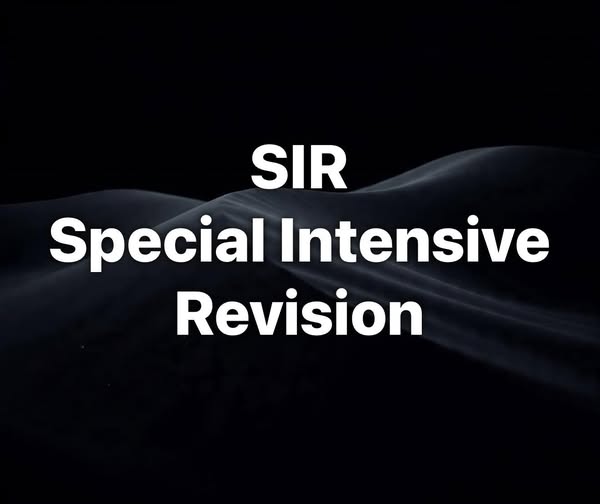Syllabus:
GS-2: Appointment to various Constitutional Posts, Powers, Functions and Responsibilities of various Constitutional Bodies.
Context:
The Election Commission of India has launched the second phase of the Special Intensive Revision of voter lists in 12 States and Union Territories, including poll-bound Tamil Nadu, West Bengal, Kerala, and Puducherry.
More on the News
- In the SIR 2.0, the house-to-house enumeration will take place for a month from November 4 to December 4, covering 51 crore voters and the draft rolls will be published on December 9.In the second phase, the EC has expanded its indicative list of 11 documents that electors can submit to 13, adding Aadhaar and an extract of the Bihar SIR roll.
- As of now, there will be no SIR in Assam, scheduled to vote next year, and a separate order will be issued for the State later.
- The first phase of the SIR was held in Bihar following which more than 68 lakh names were deleted from the electoral rolls.
Special Intensive Revision
- The Special Intensive Revision (SIR) of Electoral Rolls is a comprehensive exercise initiated by the Election Commission of India (ECI) to update, verify, and correct the electoral rolls with a focus on eliminating inaccuracies and ensuring all eligible citizens are enfranchised.
- Key Features:
- Enumeration and Documentation: This process aims to ensure the authenticity of voter records and prevent duplication or fraudulent entries.
- Verification of Residence and Citizenship: This ensures that the electoral roll accurately reflects genuine, local residents with legal citizenship status.
- Special Focus on Migrant Labourers: Authorities must adopt flexible verification methods to prevent their exclusion from the electoral process.
Constitutional and Statutory Basis
- Article 324 of the Constitution empowers the ECI with the superintendence, direction, and control for the preparation of electoral rolls for conduct of elections to Parliament and State Legislatures.
- Article 326 mandates that every Indian citizen not less than 18 years of age is eligible to be registered as a voter.
- The Representation of the People Act, 1950 (RPA, 1950) and Registration of Electors Rules, 1960 (RER) lay the procedural framework for preparing, revising, and maintaining electoral rolls.
Advantages of the SIR
- Inclusive Drive: The detailed door-to-door enumeration and verification help include previously omitted voters such as young adults, internal migrants, and disabled persons, promoting electoral inclusiveness.
- Reflection of current demographics: SIR of electoral rolls will accurately mirror the current population distribution and characteristics of a region. Facilitates Efficient Election Management: Clean and updated rolls help election officials plan polling stations better, reduce invalid or spoiled ballots, and improve logistical efficiency.
- Reinforces Democratic Legitimacy: By cleansing electoral rolls, SIR strengthens the principle of fair representation, reinforcing the legitimacy of electoral outcomes.
Challenges associated with the SIR
- Excessive Documentation Burden: Heavy documentation burden for voters enrolled post-2003, including parent birth and residence proofs, potentially disenfranchising genuine citizens.
- Overlap of Institutional Mandates: Verification of citizenship often falls outside ECI’s mandate and overlaps with roles of Home Ministry.
- Exclusionary Impact of Limited Document Options: Exclusion of Aadhaar and similar documents from accepted list complicates inclusion for marginalized and underprivileged groups.
Way Forward
- Ensuring Timely and Accurate SIR Implementation: Timely completion and robust safeguards against errors are essential to maintain the credibility and public trust in the Summary Intensive Revision (SIR) process.
- Expanding Acceptable Documentation: Accepting a wider range of identification documents such as Aadhaar, ration cards, and voter IDs can minimize wrongful exclusions and ensure genuine voters are not left out.
- Strengthening Oversight through Booth Level Agents: Political parties’ Booth Level Agents (BLAs) can play a key role in detecting and preventing omission or commission errors during voter list verification.
- Pursuing Long-Term Electoral Reforms: Future reforms should consider amending the Representation of the People Act and Rules to safeguard migrant voters’ rights and explore remote voting technologies for greater inclusion.

